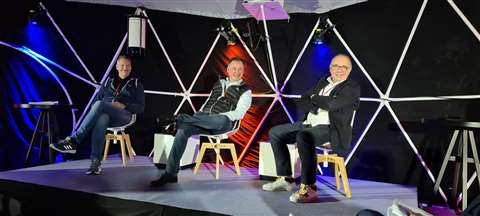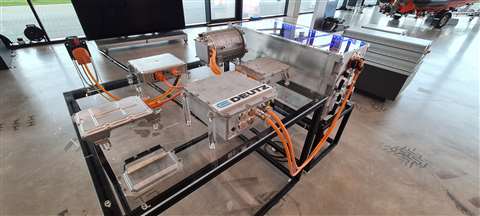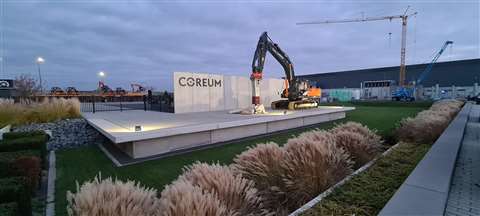INTERVIEW: Frank Hiller, CEO, Deutz
13 December 2021
 Dr Frank Hiller (centre) at the Deutz Days 21 event
Dr Frank Hiller (centre) at the Deutz Days 21 event
The Deutz Days 21 event was held in November 2021 at the Coreum exhibition and trade center in Stockstadt Am Rhein. The German engine manufacturer used the event to showcase new power technologies it was planning to bring to market. In addition to a series of low-emissions diesel engines, the OEM displayed electric powertrains for a variety of machine and marine applications, plus a prototype of the hydrogen-fuelled internal combustion engine the company is planning to launch in 2024.
Diesel Progress was invited to the one-day event and took the opportunity to speak with Frank Hiller, CEO of Deutz, about the meeting, and also about how future product plans were likely to impact the engine manufacturer and the wider engine market.
Diesel Progress: What’s the goal of Deutz Days 21?
Frank Hiller: It’s all about sustainability. We started this journey in 2017 with electrification because we were sure that something would come up besides combustion engines, they would not be the solution for the next 20, 30 years. I think we were quite early with this approach.
It’s all about being dynamic, very much like the auto industry. When you look back five years there was just the BMW i3 and Tesla Model S on the road. Now, every OEM has an electric model. I think the same will happen in our industry. It might be a little slower, but the pressure will be there, driven by regulations. What we’re showing here today is our approach to electrification and hydrogen. You can see already that we already have a lot of electric products in the market. We also see a big potential in the hydrogen engine.
Do you think electrification and hydrogen internal combustion engines mark the beginning of the end for diesel in the machine market?
I think that you could say that, but it will take considerable time. Much more than in the automotive space.
Is that fair, though, considering the advances made, DPFs and SCR treatments? Is diesel being unfairly demonised?
On the emissions side, I think the industry already has done a fantastic job, reducing particulates and CO2. But as an industry, we must continue to address the CO2 topic. We need to keep the global temperature increase below 2C. That’s not a reduction, but keeping the increase to a minimum. I think there’s a social responsibility to act, but it will also be enforced through regulation.
I think we will see a lot of regulations, so we want to be prepared. We want to have the products in place as customer demand increases.
 Deutz Modular Battery Kit at the Deutz Days 21 event
Deutz Modular Battery Kit at the Deutz Days 21 event
On the other side, I think there will be great pressure on the supply side. Today we use the same suppliers as the car and truck OEMs. As these companies shift towards electrification the supply base for components for combustion engine, will shrink and will become more expensive. The competitiveness of alternative drives in comparison to combustion engines will thus increase.
Can you leverage your global reach to off-set supply side issues? Can you draw on South America or Asia?
To be honest, Asia has great potential. With our JV partner SANY we have set up local capacities for production and therefore we had to localise part sourcing, too. This automatically gives us a second source for the European market.
So it’s regionalisation; instead of bringing parts across from Europe you’ll source within? It’s almost a globalisation backlash, where regional production is now favoured.
I think it will become more difficult to work together internationally, between certain regions, but overall globalisation is here to stay. But right now, there are political restrictions making life more difficult.
In what way?
The trade war between the US and China is an issue. Europe is somewhere in the middle, being forced to decide which side it supports. It’s a challenge for international companies.
Do you think Deutz will separate into different divisions to support the different power technologies?
Our reporting segmentation was previously based on smaller and bigger engines. Now it’s really a separation between green solutions and classic solutions. Classic still makes up 96% of our turnover today, but within 10 years we expect the green segment to be more than 50% of turnover across the group. A change is going on.
 Coreum in Stockstadt Am Rhein is designed for training and events related to off-road machinery
Coreum in Stockstadt Am Rhein is designed for training and events related to off-road machinery
Why are we doing this? To make it transparent to our customers, our employees, and the financial market how we intend to grow our share of new technologies.
The full interview with Frank Hiller will be published in the Jan/Feb issue of Diesel Progress International magazine.
STAY CONNECTED




Receive the information you need when you need it through our world-leading magazines, newsletters and daily briefings.
POWER SOURCING GUIDE
The trusted reference and buyer’s guide for 83 years
The original “desktop search engine,” guiding nearly 10,000 users in more than 90 countries it is the primary reference for specifications and details on all the components that go into engine systems.
Visit Now
CONNECT WITH THE TEAM










